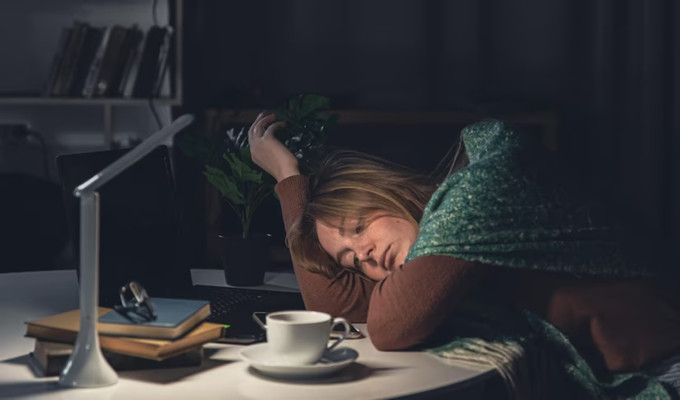Should you skip drinking coffee first thing in the morning? Experts elucidate
Most of us can’t start the day without our daily coffee boost. We wake up, drag ourselves out of bed and head straight to the kitchen to get that sweet caffeine hit. Ah, the comforting aroma of a fresh morning brew! Without it, it almost seems like life would function in slow motion.
A much-loved beverage across the world, coffee has been part of several debates recently, mostly discussing whether its harmful effects outweigh the benefits.

While we all know that caffeine should be consumed in moderation throughout the day, what about drinking coffee within the first hour of waking up in the morning?
In a recent Instagram reel, content creator and podcaster Mel Robbins cautioned viewers to stop drinking coffee as soon as they wake up, indicating that it can shoot up cortisol levels and increase feelings of anxiety. “If you’re watching this while sipping your morning coffee… PUT THE CUP DOWN!!” she captioned the video.
View this post on Instagram
A post shared by Mel Robbins (@melrobbins)
To understand more, we spoke to clinical dietician and certified diabetes educator, Kanikka Malhotra along with Dr Pranav Honnavara Srinivasan, consultant gastroenterology surgery, gastrointestinal oncology and bariatric surgery at Sparsh Hospital, about the effects of morning coffee and the potential long-term consequences.
Does consuming coffee within the first hour of waking have a significant impact on our health?
When you start your day with coffee, Malhotra says, caffeine quickly reaches the receptors responsible for stimulating your body. Adenosine, which also uses these receptors, is displaced by the caffeine rush, causing an increase in adenosine levels in your system.
As a result, as the caffeine effect wears off, stored adenosine rushes to connect to receptors, she adds, causing drowsiness. This occurrence causes an abrupt energy drop in the middle of the day, often known as rebound tiredness.
Malhotra further explains, “Consistent caffeine usage in the morning might lead to dependence. Over time, you may need more caffeine to feel normal, which raises adenosine levels and causes a fall in energy levels.”
Drinking coffee immediately after waking can lead to a spike in cortisol levels, she states, cortisol is a stress hormone, which may disrupt the body’s natural production cycle and potentially contribute to stress-related health issues.
 Drinking a glass of water on an empty stomach before consuming coffee can be beneficial, according to Dr Pranav Honnavara Srinivasan (Source: Freepik)
Drinking a glass of water on an empty stomach before consuming coffee can be beneficial, according to Dr Pranav Honnavara Srinivasan (Source: Freepik)
Concurring Dr Srinivasan adds that cortisol is essential when it comes to waking up in the morning as it aligns itself with the body’s internal clock.
“Introducing caffeine, which can artificially elevate cortisol, might disrupt this natural process, potentially affecting sleep patterns and overall well-being, particularly if consumed in large quantities or by individuals sensitive to caffeine,” he warns
He also supports Robbins’ claim that coffee consumption in the morning should be delayed and not taken right after waking up. He says, “The optimal impact of coffee might be better realised if its consumption is delayed until after the body’s natural cortisol surge.”
On Mel Robbins’ reel about the adverse effects of drinking coffee on an empty stomach
Malhotra says that she agrees with Robbins to an extent and explains why. First, she elucidates, cortisol levels usually peak between 7 and 8 am and steadily drop during the day, reaching their lowest point in the middle of the night while you sleep.
According to her, cortisol aids in the maintenance of your body’s sleep-wake cycle, known as the circadian rhythm. However, the stimulating effects of caffeinated coffee in the morning might raise cortisol levels. Some people may like the extra jolt, while others may become more worried, jittery, or angry. Everyone’s sensitivity, or internal response to caffeine, is different.
Secondly, caffeine is a diuretic, which means you’ll want to urinate more frequently; yet, after a night of sleep, one needs to stay hydrated and not lose any more liquids. “I would wait at least an hour after waking up before drinking the initial coffee of the day,” she recommends.
Dr Srinivasan also reminds readers that:
*Not all advice is backed by scientific evidence.
*Health and nutrition are highly individual, what works for one person might not work for another.
*Social media platforms often host a mix of expert and non-expert opinions, making it challenging to discern reliable information.
*The best approach to health advice is consulting with healthcare professionals and relying on peer-reviewed scientific research.
He does, however, agree that drinking water before your coffee does indeed help. Drinking a glass of water on an empty stomach before consuming coffee is beneficial for several reasons, he discloses:
*It rehydrates the body after overnight dehydration.
*Water can aid in the preparation of the digestive system for food intake, potentially mitigating the acidic effects of coffee.
*Starting the day with water, rather than immediately introducing a diuretic like coffee, supports overall hydration levels.
Are there any potential long-term health consequences associated with regularly consuming coffee within the first hour of waking?
Malhotra advises against regularly consuming coffee within the first hour of waking as it may have potential long-term health consequences. Here are some key points she urges everyone to keep in mind:
*Adverse effects on digestion: Drinking coffee on an empty stomach or before breakfast can lead to upset stomach and indigestion due to its high acid content, potentially causing discomfort and impacting digestion.
*Dependency and tolerance: Regular consumption of coffee in the morning can lead to dependence, where individuals may require more caffeine to feel normal, potentially impacting energy levels and overall health in the long run.
*Dehydration and hydration levels: Coffee consumption in the morning can contribute to dehydration, which may have long-term effects on hydration levels if not balanced with adequate water intake.
*Potential impact on chronic diseases: While moderate coffee consumption has been associated with health benefits, excessive or improper consumption, especially in the morning, may have implications for chronic diseases like type 2 diabetes and liver disease.
Disclaimer: The copyright of this article belongs to the original author. Reposting this article is solely for the purpose of information dissemination and does not constitute any investment advice. If there is any infringement, please contact us immediately. We will make corrections or deletions as necessary. Thank you.





